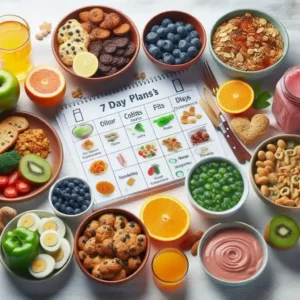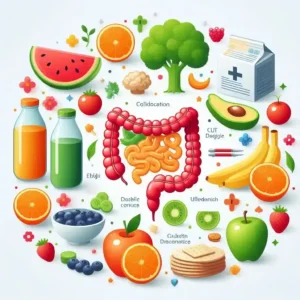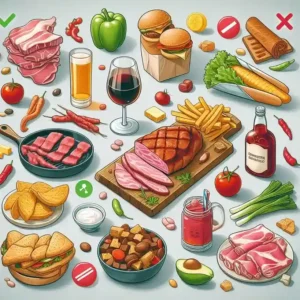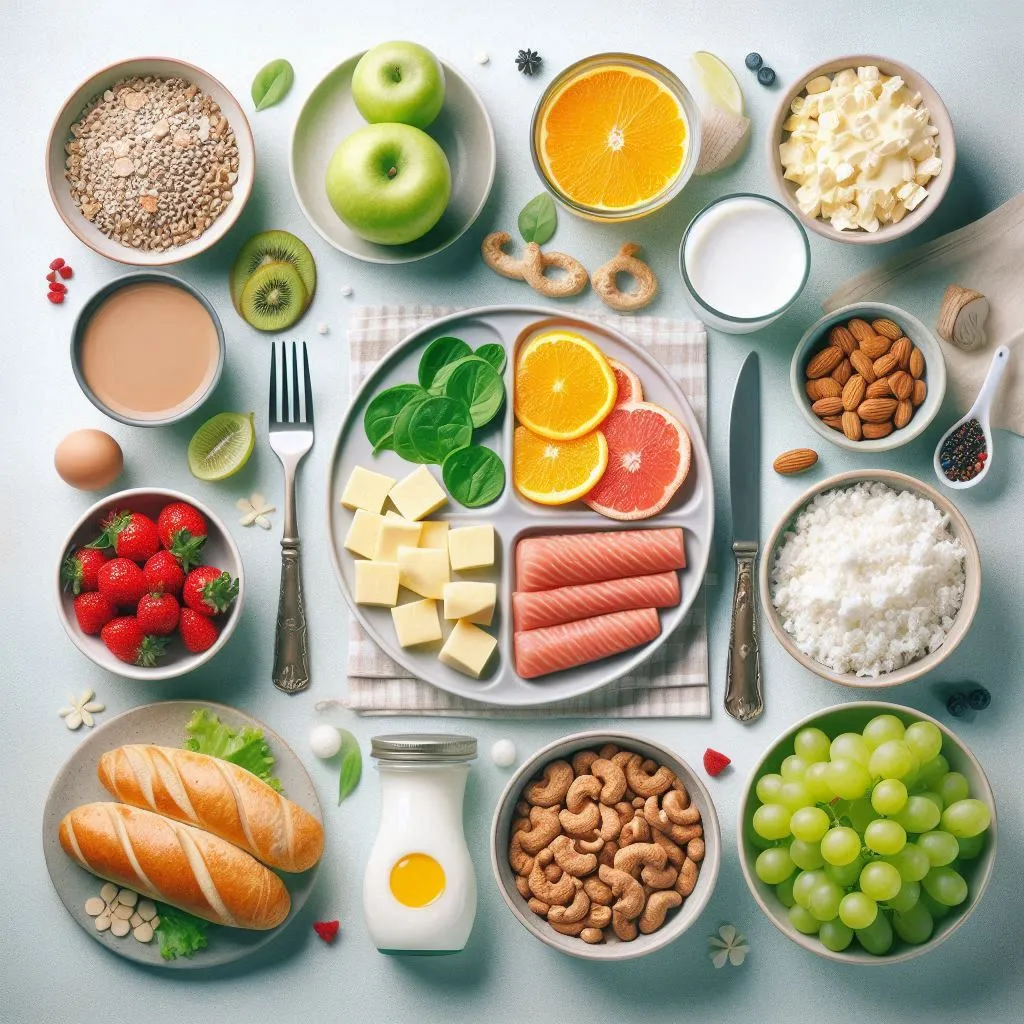Disclaimer: Although this seven-day meal plan may work well for patients with ulcerative colitis, it’s vital to note that everyone with IBD has a unique gut. It is essential to consult your healthcare provider. They may advise you on any dietary restrictions, such as the recommended daily fiber consumption, to ensure that both diets are safe and useful to your specific health needs.
Inflammatory bowel disease (IBD) refers to two conditions: Crohn’s disease and ulcerative colitis. Chronic gastrointestinal (GI) tract inflammation is a crucial component that can cause harm to the gut over time. Crohn’s disease can affect any section of the gastrointestinal system, although it commonly begins in the small intestine. Ulcerative colitis affects the large intestine and rectum. Common symptoms include diarrhea, stomach discomfort, bloody stools, weight loss, and exhaustion. When a person with IBD has a flare-up, their nutritional intake drops significantly. Unfortunately, the origin is unclear; nevertheless, genetics and an overactive immune system contribute to GI tract inflammation.


A proper diet plan is essential to reduce ulcerative colitis symptoms and keep the intestine healthy and well-rounded. In contrast, improper eating habits and consumption of food that can trigger ulcerative colitis can worsen the situation. The diet regimen comprising a seven-day diet plan is helpful in relieving inflammation and flare-ups and soothing the intestinal environment. A complete schedule has been worked out with customized meals for the patient suffering from Ulcerative Colitis (UC), along with foods to avoid ulcerative colitis.
Diet Basics for Ulcerative Colitis


There is no special diet that can help prevent or cure IBD. However, there are dietary habits that can assist in minimizing inflammation and flare-ups while also improving nutrition. Most individuals do not eat enough when they have ulcerative colitis because of the discomfort and diarrhea they experience. Living with Crohn’s disease or colitis makes meal planning difficult. It’s not always obvious what the greatest meal is for someone with Crohn’s or colitis. Some foods may aggravate your symptoms and inflammation, therefore a colitis diet plan might be beneficial.
Eating meals, comprising of lean proteins, herbs and spices (but avoid hot or spicy ones), fruit, and grains, can make the stomach feel full and provide important and anti-inflammatory nutrients to the gut.
Foods to Avoid Colitis Flare-ups:


It is important to note that, while some meals are widely referred to as trigger foods, response can vary from person to person. For example, dairy, spicy meals, and foods high in insoluble fiber may be troublesome for some people. Lactose-free alternatives, milder but still tasty herbs and spices, and well-cooked vegetables can be helpful in UC.
Below is the list of foods to avoid inflammation:
- Processed foods (includes: bacon, sausages)
- Red meat (includes: fats)
- Excessive alcohol.
- Junk food (includes: candies, chips)
- High-sugar foods and drinks.
Role of Foods for IBD:
The benefits of eating anti-inflammatory foods cannot be emphasized, especially for those with Crohn’s or UC. Turmeric, ginger, and berries are among foods that contain anti-inflammatory properties and support digestive health. Incorporating them into your everyday diet will help you control your symptoms and enhance overall performance.
7-Day Meal Plan for Ulcerative Colitis:
The 7-day eating plan is intended for persons suffering from Crohn’s disease or ulcerative colitis. This 7-day meal plan is based on an ulcerative colitis diet designed to decrease inflammation in the intestines and avoid flare-ups. Below is a complete diet with meals particularly designed for people with UC.
The Mediterranean Diet is one of the safest dietary patterns that ESPEN (European Society for Clinical Nutrition and Metabolism) also recommends as an alternative for UC patients. This diet consists of high consumption of vegetables and fruits, as well as legumes and whole grains, which are strong in antioxidants and dietary fiber, as well as nuts, salmon, and olive oil, which are high in monounsaturated and polyunsaturated fatty acids. The Mediterranean diet contains modest amounts of dairy, particularly fermented dairy products (such as yogurt, kefir, and cheese) and eggs.
Day 1
Breakfast:
Banana muesli (Rolled oats, almond milk, ripe banana, and honey).
Lunch:
Rice and Chicken soup (includes: celery, bone broth, skinless chicken, white rice, and carrots)
Dinner:
Baked salmon with steamed vegetables (includes: salmon, and fresh vegetables).
Day 2
Breakfast:
Rice Porridge (includes: white rice, and water).
Lunch:
Turkey and Avocado Wrap ( includes: gluten-free tortilla wraps, turkey breast, avocado, and lettuce)
Dinner:
Grilled or baked Chicken breast with Mashed Potatoes (includes: skin potatoes, chicken broth, skinless chicken breast)
Snack:
Blueberry Smoothie (almond milk, blueberries, honey).
Day 3
Breakfast:
Yoghurt and Berries (includes: coconut yogurt, blueberries, and strawberries)
Lunch:
Quinoa salad (includes: quinoa, bell peppers, lemon juice, cucumber).
Dinner:
Baked cod and sweet potatoes (includes: sweet potato, olive oil, cod fillet).
Snack:
Rice cakes with almond butter (includes: white rice, fresh almond butter).
Day 4
Breakfast:
Scrambled eggs (includes: eggs, olive oil)
Lunch:
Butternut squash soup (includes: butternut squash, coconut milk, chicken broth).
Dinner:
Turkey meatballs with zucchini noodles (includes: zucchini, garlic cloves, ground turkey, olive oil, and seasonings)
Snack:
Banana and almond butter (includes: Fresh Banana, and almonds)
Day 5
Breakfast:
Smoothie bowl (includes: almond milk, honey, chia seeds, and frozen berries)
Lunch:
Grilled Vegetables with Hummus Wrap (includes: capsicum, zucchini, eggplant, gluten-free tortilla).
Dinner:
Baked chicken with grilled vegetables (includes: carrots, green beans, skinless chicken thigh, and olive oil).
Snack:
fresh fruit (including pear slices).
Day 6
Breakfast:
Quinoa porridge (includes: quinoa, cinnamon powder, honey, almond milk).
Lunch:
Chicken salad with olive oil dressing ( includes: chicken breast, cucumber, olive oil, green veggies, lemon juice).
Dinner:
Stir fry shrimp and mixed vegetables with white rice (includes: carrots, bell peppers. green peas, white rice, shrimp, and olive oil).
Snack:
Banana Smoothie with spinach (includes: banana, almond milk, spinach).
Day 7
Breakfast:
Rice Cereal with Berries (includes: almond milk, strawberries, blueberries, and rice cereal)
Lunch:
lentil soup (includes: lentils, bone broth, celery, and carrots)
Dinner:
Grilled salmon and steamed asparagus (includes: olive oil, asparagus, and salmon)
Snack:
Apple puree (includes: steamed apples)/ Popcorns.
Drink enough water every day to keep hydrated. It is significant for the normal functioning of the digestive system Caffeine-free drinks and beverages, such as ginger tea and chamomile tea, can keep you hydrated whilst providing soothing effects. Having probiotics can be beneficial for gut health. Eating frequent and small portions of meals can be beneficial for the digestive system to work properly. Having mixed vegetables in meals can be easier and lighter on the digestive system.
Conclusion:
Dietary control is critical in ulcerative colitis. This 7-day eating plan offers a balanced approach to calming and nourishing your stomach while also reducing inflammation and speeding up healing. Remember to check with your doctor or a nutritionist before making any major dietary changes. Focusing on foods that reduce colon inflammation and avoiding irritants will help you manage your symptoms and enhance your overall quality of life.




1 Comment
Pingback: Understanding Ulcerative Colitis: Symptoms, Causes, and Management Strategies Complete Overview - 9ledge Feed